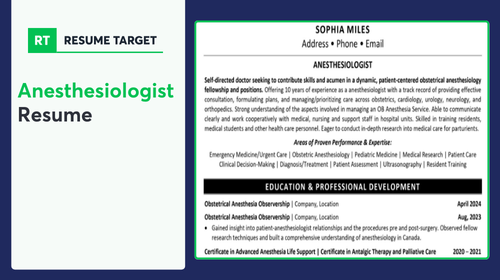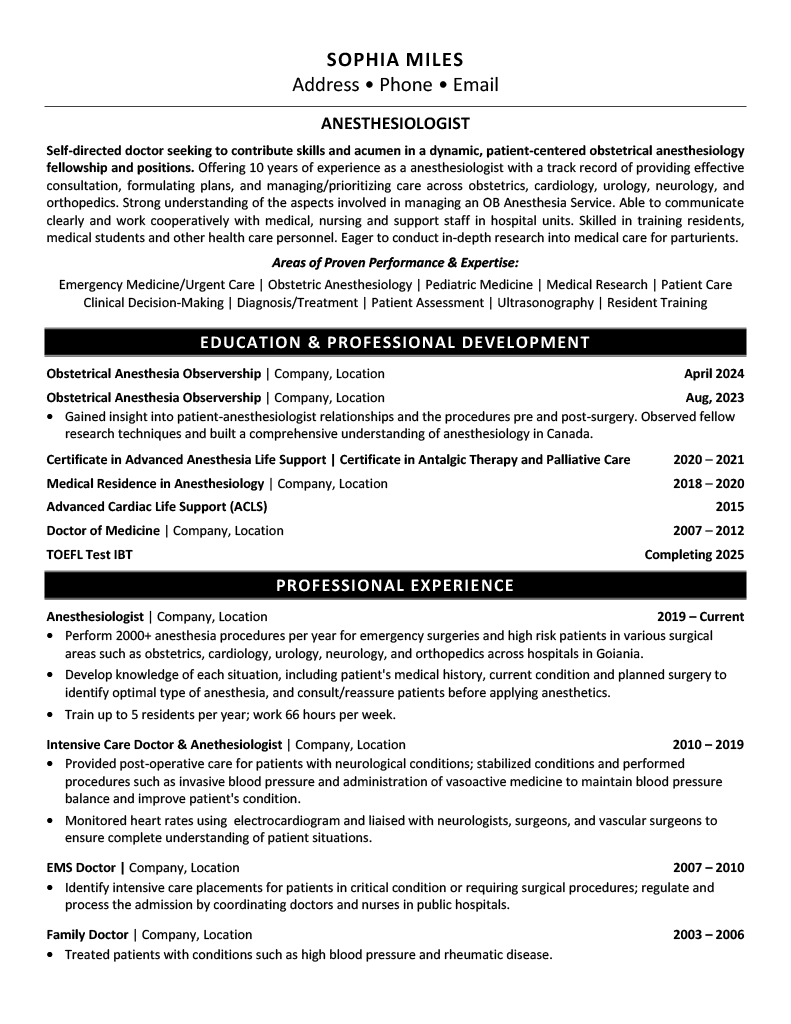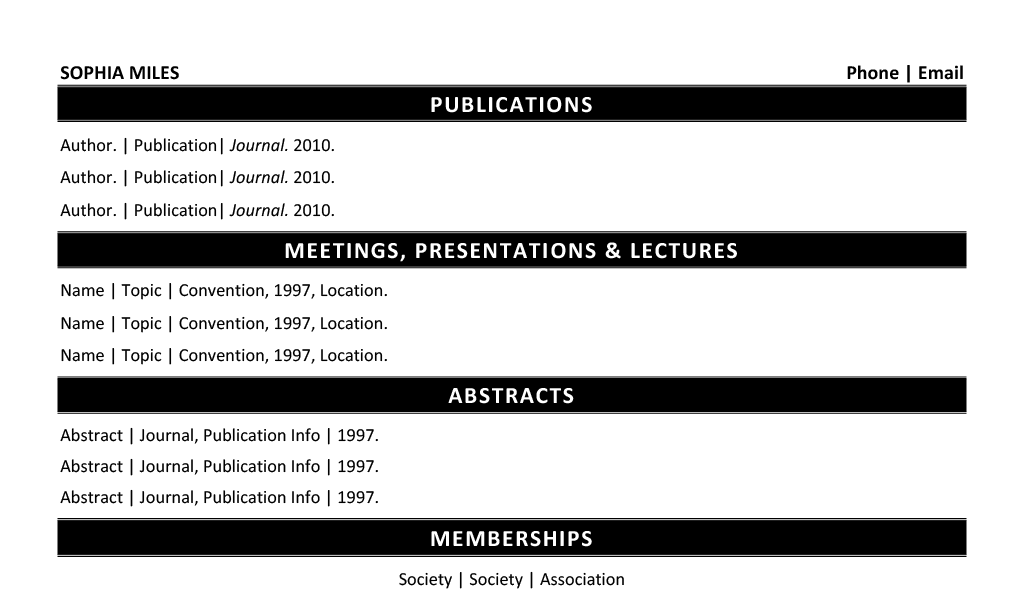

Putting patients to sleep is your expertise, but waking up hiring managers to your value takes special skill. Many anesthesiologists struggle to translate complex procedures and patient outcomes into compelling resume content.
Are you finding it hard to stand out in a competitive field? Your resume needs to showcase both your technical mastery and your contribution to surgical success rates. A well-crafted resume can move you from consideration to must-interview status.
At Resume Target, we understand the unique challenges anesthesiologists face in the job market. We help you transform detailed medical expertise into clear achievements that highlight your impact on patient safety and surgical efficiency.


As the guardians of patient consciousness and comfort, anesthesiologists make modern surgery possible by delivering precise, personalized anesthesia care before, during, and after surgical procedures.
These highly trained physicians don't just "put patients to sleep"- they orchestrate a complex medical symphony, carefully managing vital signs, pain levels, and organ function while making split-second decisions that can mean the difference between life and death in the operating room.
If you're fascinated by this critical intersection of pharmacology, physiology, and acute care medicine, you'll want to understand the intensive training path and diverse career opportunities that await aspiring anesthesiologists in both hospital and outpatient settings.
Let's talk about the exciting earning potential in anesthesiology! Your career path as an anesthesiologist opens doors to exceptional compensation packages, with opportunities to earn well above average medical professional salaries. And guess what? Your earning potential grows significantly as you gain experience and specialized expertise.
Figures from: U.S. Bureau of Labor Statistics
From residency to leadership positions, your journey as an anesthesiologist offers multiple paths for growth. With the right combination of experience and specialized training, you can advance from clinical practice to department leadership.
Beyond medical expertise, advancing your career requires mastering both technical and leadership capabilities that set you apart in the operating room and boardroom.
- Advanced monitoring and life support techniques - Regional anesthesia expertise - Clinical research and publication experience - Leadership and team managementTo become an anesthesiologist, you'll need to complete a bachelor's degree, medical school, and a four-year residency program, focusing on developing strong clinical skills and specialized knowledge in anesthesia care.
Your path to becoming an anesthesiologist requires developing key professional attributes, including what research identifies as critical thinking skills and calmness under pressure to ensure successful patient care.
Requirements from American Society of Anesthesiologists
From bustling physician offices to major hospitals, anesthesiologists find robust opportunities across coastal and midwest states.
Figures from U.S. Bureau of Labor Statistics
Struggling to distill years of medical training, critical care experience, and countless procedures into a compelling anesthesiologist resume that stands out to medical directors and hiring committees? Let's walk through a clear, section-by-section guide that will help you create a powerful resume highlighting your clinical expertise, patient safety record, and professional achievements.
As an anesthesiologist who excels at monitoring vital signs and managing complex medical situations, you might find it challenging to monitor and manage the vital signs of your own resume summary.
While you're skilled at precisely calculating dosages and maintaining patient stability in high-pressure situations, translating these critical abilities into compelling written form requires a different kind of precision - one that helps hiring managers quickly understand your expertise in patient care, pain management, and surgical support.
How would you characterize your approach to patient care and safety across the various surgical environments you've worked in?
Reason: This helps frame your overall professional philosophy and demonstrates your primary focus on patient safety, which is crucial for an anesthesiologist's summary. It sets the tone for your entire resume by highlighting your core professional values.
What unique combination of subspecialties, surgical settings, and patient populations have shaped your practice as an anesthesiologist?
Reason: This question helps you articulate your broad scope of expertise and versatility, allowing you to craft a summary that immediately communicates your comprehensive experience to potential employers.
How has your collaboration with surgical teams and integration of new anesthesia technologies evolved throughout your career?
Reason: This helps you articulate your adaptability and teamwork capabilities, which are crucial elements in modern anesthesiology practice. It allows you to showcase both your interpersonal skills and technical expertise in your summary.
As an anesthesiologist, your resume needs to demonstrate both your advanced clinical expertise in administering anesthesia and monitoring vital signs, as well as your critical decision-making abilities in high-pressure situations.
From managing complex cases in the operating room to coordinating with surgical teams and providing post-operative pain management, your skill set must reflect both technical medical proficiency and essential interpersonal capabilities.
Showcase your medical expertise by organizing your clinical experience into three powerful sections: a concise role overview highlighting your specialties, quantifiable patient care achievements, and core responsibilities that demonstrate your mastery of anesthesia administration and perioperative care.
Many anesthesiologists struggle to effectively communicate their clinical expertise and patient safety record beyond basic procedural statistics. Transform your achievements into compelling evidence of excellence by connecting patient outcomes, operational efficiency, and risk management metrics to demonstrate your comprehensive impact on healthcare delivery.
The responsibilities section demonstrates how you manage patient care beyond basic medical procedures. It shows hiring managers your ability to handle complex medical situations while communicating your expertise in terms that showcase your impact on patient outcomes and hospital operations.
Your education and board certifications are crucial elements that validate your expertise as an Anesthesiologist. Start with your medical degree and residency training, then highlight your board certifications and any subspecialty credentials that demonstrate your advanced competencies in perioperative medicine and pain management.
Now that you've created a strong foundation using Resume Target's proven resume writing guidelines, you're ready to transform your medical CV into a powerful tool for landing your ideal anesthesiology position.
While many physicians focus solely on customizing their cover letters, tailoring your anesthesiologist resume for each specific hospital, surgical center, or medical practice is equally crucial for standing out in this competitive field.
A customized resume helps you clear ATS screening systems by incorporating key medical terminology and required credentials, while also demonstrating to hiring managers how your specific surgical experience, patient care approach, and specialized skills align perfectly with their facility's needs.
Ready to make your anesthesiologist resume work harder for you? Let's transform it from a standard CV into your secret weapon for landing more interviews!
Don't let limited clinical experience hold you back from pursuing your dream career as an Anesthesiologist! Your medical school education, residency training, and hands-on clinical rotations provide the perfect foundation for showcasing your qualifications.
Focus on highlighting your medical degree, board certifications, and clinical competencies as the cornerstones of your resume.
For detailed guidance on structuring your medical credentials, check out our Student Resume Writing Guide to ensure you're presenting your qualifications in the most impactful way.
Your resume summary is your chance to showcase your medical school excellence, clinical rotations, and residency achievements in a compelling way that catches attention.
Focus on highlighting your specialized training, patient care experience, and the technical skills that make you a promising anesthesiology professional.
"Detail-oriented and compassionate Anesthesiologist with comprehensive medical training and successful completion of a 4-year anesthesiology residency program at [Hospital Name]. Demonstrated expertise in pre-operative assessment, pain management protocols, and advanced monitoring techniques through 2,000+ supervised procedures. Recognized for exceptional patient care and clear communication with surgical teams. Seeking to provide safe, effective anesthesia care while contributing to positive surgical outcomes at a leading medical facility."
Now's your chance to showcase the rigorous medical training and specialized expertise that makes you an exceptional anesthesiologist - let's make your education section truly stand out!
Transform your academic achievements into compelling content by highlighting relevant coursework like Advanced Pharmacology and Clinical Rotations, plus any research projects or specialized certifications that demonstrate your mastery of anesthesiology practices.
Comprehensive research conducted provides an overview of fundamental and elective courses for Anesthesiologist education.Relevant Coursework: Advanced Clinical Anesthesia | Pharmacology and Pain Management | Patient Monitoring Systems | Regional Anesthesia Techniques | Critical Care Medicine | Perioperative Medicine
Key Projects:
Clinical Simulation Research Project: Led a comprehensive study on optimizing patient monitoring protocols during complex surgical procedures, resulting in development of enhanced safety checklist implementation.
Multi-Center Pain Management Study: Collaborated with interdisciplinary team to research effectiveness of various regional anesthesia techniques in post-operative pain management.
Leverage your medical school training, clinical rotations, and residency experience to showcase the precise technical and patient care abilities that healthcare employers seek in new anesthesiologists.
As a newly qualified anesthesiologist, your combination of clinical expertise and patient care skills positions you well for a rewarding career in a field that continues to see strong demand and opportunities for professional growth.
When every second in the OR counts, finding the right words to capture your precise clinical expertise and critical decision-making skills on paper can feel overwhelming.
At Resume Target, we specialize in crafting powerful medical resumes that highlight both your technical proficiency and patient care excellence.
Our team has helped countless anesthesiologists showcase their unique combination of procedural expertise, emergency response capabilities, and leadership in perioperative care.
With hospital hiring cycles ramping up and increasing demand for specialized anesthesiologists, now is the perfect time to elevate your career story - let's start with a free consultation today.
Impress any hiring manager with our Medical resume writing service. We work with all career levels and types of Medical professionals.
Learn More → Medical Resume Writing Services